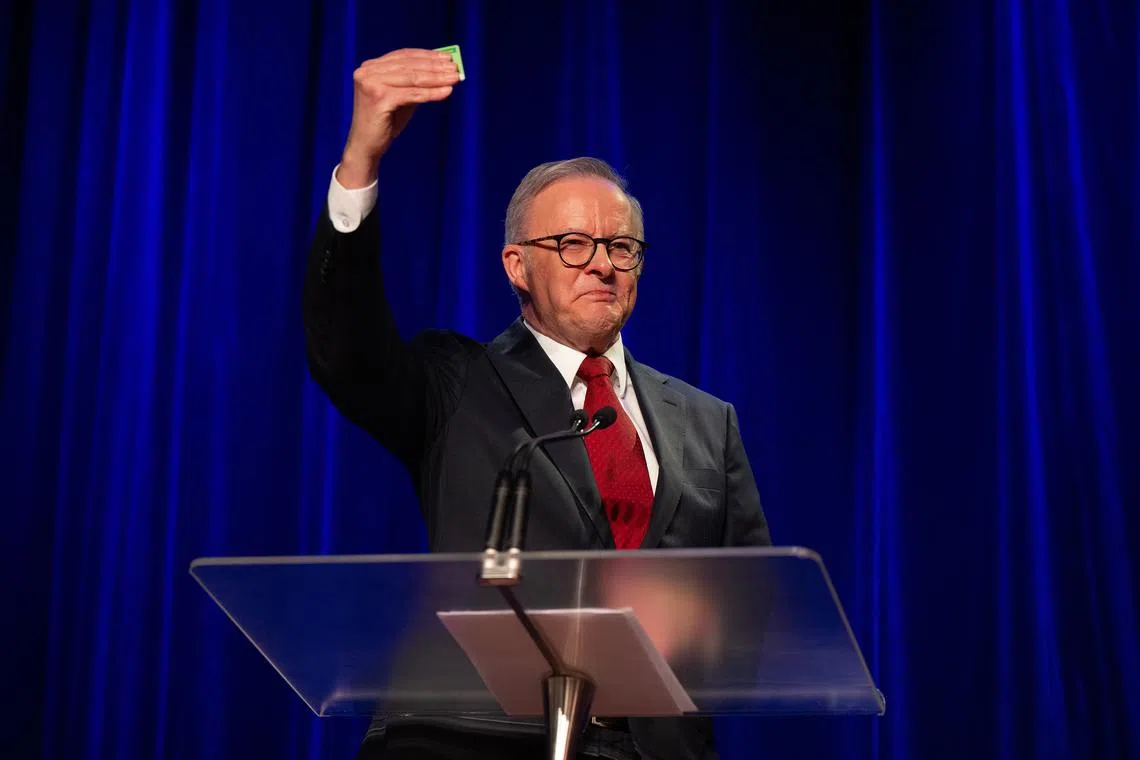Australia’s re-elected government says US-China tussle will be top priority
Sign up now: Get ST's newsletters delivered to your inbox

Australian Prime Minister Anthony Albanese's Labor Party appears likely to expand its majority in Parliament to at least 85 seats from 77.
PHOTO: EPA-EFE
Follow topic:
SYDNEY - Australia’s Labor government will prioritise dealing with the “dark shadow” of the US-China trade war following its resounding re-election victory
Labor Party leader Anthony Albanese, Australia’s first prime minister to win a second consecutive term in two decades, promised in remarks on May 4 that he would run a disciplined and orderly government, stressing that Australians had voted for unity.
The centre-left Labor Party appeared likely to expand its majority in Parliament to at least 86 seats from 77, the Australian Broadcasting Corp (ABC) projected, after most polls had suggested it would struggle to keep its slim hold on the 150-seat Lower House.
About three-quarters of votes have been tallied, with counting to resume on May 5.
Echoing an election in Canada less than a week earlier, Australia’s conservative opposition leader, Mr Peter Dutton, lost his seat as voters, who initially focused on cost-of-living pressures, grew increasingly concerned about US President Donald Trump’s sweeping tariffs and other policies.
“We will be a disciplined, orderly government in our second term, just like we have been in our first,” Mr Albanese told reporters while visiting a coffee shop in his Sydney electorate where he said his late mother took him as a child.
“The Australian people voted for unity rather than division,” he added in brief public comments.
Polls had shown Labor trailing the opposition conservative coalition for nine months until March, amid widespread angst about the government’s handling of inflation.
But the polls flipped when the conservatives unveiled a proposal to slash the federal workforce, which was compared to the Trump administration’s moves to cut back government agencies.
A proposal to force federal workers back to the office five days a week was also criticised as unfair to women.
Mr Trump’s April 2 tariff announcement
“The immediate focus is on global economic uncertainty, US and China, and what it means for us,” Mr Chalmers told ABC.
“What’s happening, particularly between the US and China, does cast a dark shadow over the global economy... We need to have the ability, and we will have the ability, to manage that uncertainty.”
Representatives of the US and China joined leaders from around the world in congratulating Mr Albanese and his party.
The US “looks forward to deepening its relationship with Australia to advance our common interests and promote freedom and stability in the Indo-Pacific and globally”, Secretary of State Marco Rubio said in a statement.
A spokesperson for China’s Foreign Ministry said the country “stands ready to work with the new Australian government (to) continue advancing a more mature, stable and productive comprehensive strategic partnership”.
Senior figures in Australia’s conservative coalition, meanwhile, began apportioning blame for the loss as it begins the search for a new leader.
Mr Mark Speakman, leader of the coalition’s main Liberal party for the state of New South Wales, said the party needed to connect its values of “aspiration, innovation and opportunity” to “modern-day NSW, including for women and people from non-English speaking backgrounds”.
Mr Simon Birmingham, a former finance minister who quit before the election, said in a LinkedIn post that “there must be a reshaping of the party to connect it with the modern Australian community”.
“Based on who’s not voting Liberal, it must start with women,” he wrote. “Based on where they’re not voting Liberal, it must focus on metropolitan Australia.” REUTERS

